Sudan election a good first step
By Jehron Muhammad -Contributing Writer- | Last updated: Apr 25, 2010 - 9:32:41 AMWhat's your opinion on this article?
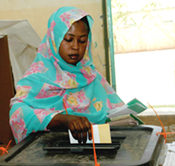
Omyma Yosif Ghabosh places ballot into box.
|
Meanwhile African Union chief Jean Ping hailed Sudan April 17 for “peacefully conducted” elections as Khartoum kicked off vote-counting following five days of balloting. The African Union was among international bodies that sent election monitors to observe polling.
Mr. Ping commended the “people of the Sudan and Sudanese political parties for peacefully conducting the just-concluded multi-party general elections.”
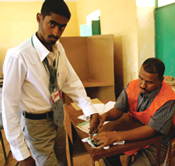
Fady Babekar Ahmed, age 23, works for a public relations fi rm. He is dipping his
fi nger in ink to show that he has voted. Photos: Jerhron Muhammad
|
The central government Khartoum and leaders in Southern Sudan signed the deal that opened the way for national elections and for a referendum next year on whether the oil-rich South, which is also mainly Christian and Animist, will secede from the Islamic North. This political process ended a bitter decades long civil war that left some 2 million dead and some 4 million people displaced.
The European Union and Carter Center observation missions praised the Sudanese people for overcoming overwhelming odds and still being able to achieve high voter participation. “Turnout is very high, 60 percent, but with significant deficiencies,” said EU mission head Veronique de Keyser, in remarks to the media.
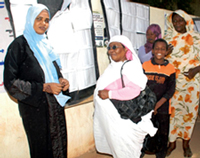
Family at wall locating their names outside of a polling station in Khartoum.
|
Though many parties suddenly withdrew from the election, their names remained on the ballot giving voters the full range of candidates to choose from, Mr. Carter noted.
He stressed the importance of international observers saying, “Their presence helps deter fraud and taking away the peoples' right to vote and international observers reveal lessons that have been learned, and how the future process of democracy can be improved.”
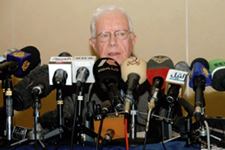
Jimmy Carter offers assessment of Sudan’s elections at press conference. His Carter Center was
among groups that served as election observers.
|
During his brief and to the point presentation, the 85-year-old expressed “hope that all of the …political factions… (would someday) participate in the future in a positive dialogue with one another to insure unity in this great country.”
Mr. Carter also acknowledged that the over 60 percent turnout far outweighed American participation in voting which is usually just above 40 percent.
He pointed out that the Carter Center has been involved in 78 elections, “many of them in Africa,” since its inception.
What the former U.S. president didn't take the time to do is actually compare the Sudanese election with other African elections, or provide observations on what this election means to the Motherland. On a continent plagued by election fraud and polling that many times results in confl ict and war, Sudan's election finished without a major incident.
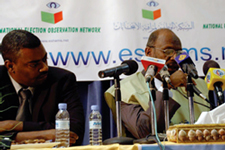
National Elections Observation Network offi cial spokesperson Tareq Mubarak Mubarak Majzoub,
left, in this photo taken at press conference hosted by the NEOB. NEOB is voluntary network
designed to monitor the elections.
|
Some questioned why these developments weren't the focus on the western observers' press conferences.
Mr. Carter's appeal for dialogue and increased party participation appeared to fall on deaf ears. Most major opposition parties in the North, including the Sudan Communist Party, the Umma Party, and the Umma Reform and Renewal Party withdrew from the race days before voting started.
They began berating the ruling National Congress Party saying the party of President Omar Al-Bashir had made it impossible for a free and fair election process.
The NCP's junior partner in the government of national unity, the Sudan Peoples Liberation Movement, also decided against participating in the North with limited exceptions for similar reasons.
The lack of participation made it apparent that incumbent and presidential candidate Al-Bashir would win reelection by an overwhelming margin.
“By contrast,” according to the Sudan Tribune, “the legislative and gubernatorial elections in the North were expected to witness a stiff competition between parties some of which are relying on a religious followers base such as the Unionist Party (DUP) whose leader Mohamed Osman Al-Mirghani is also the head of the Al-Khatmiya religious sect.”
This was the country's first multiparty election in 24 years. There were 27 default winners in the National Assembly, the Southern Sudan Legislative Assembly, and state legislative assemblies, announced April 17 by the National Election Commission. These winners were known since the beginning of the election because there was only one candidate running for office.
President Carter said it was unfortunate that “many political rights and freedoms were circumscribed” for most of the period leading up to the election, “fostering distrust among the political parties.”
Veronique de Keyser, who led a delegation of 130 monitors from 25 European countries, also said the election suffered from “signifi cant deficiencies,” including problems getting ballots to polling places, poll stations opening late or not at all and charges of voter intimidation.
Sudan's National Election Commission seemed at odds with the European Union and Carter Center findings, saying those assessments should have taken into account the context of the election.
Both reports “do not take into account conditions in which the elections took place,” National Election Commission vice chairman Abdullah Ahmed Abdullah told the press.
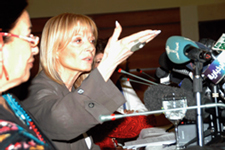
European Union Election Commission chief election observer Veronique de Keyser.
|
Husahim Elzien, who ran for congress under the Democratic Unionist Party banner, had a different take on the Carter Center report. He felt the Carter Center's acceptance of the government's invitation to monitor elections and its partially favorable report was tantamount to putting its stamp of approval on the election process.
In addition, Mr. Elzien charged that the government bused in soldiers as registered voters, or included soldier barracks in redistricting. These soldiers, suggested Mr. Elzien, were expected to vote for the ruling party.
Dr. Nado Elzein, a physicist and deputy dean of the faculty of applied sciences and computers at Omdurman University, felt government control of the election process gave the National Congress Party an unfair advantage. Still, she said, sitting out the election process was not an option.
“Change can't come with dreams, there should be some movement,” said Dr. Elzein said.
Related news:
Sudan kicks off and extends elections (FCN, 04-13-2010)
African leaders call for peaceful elections in Sudan (FCN, 04-09-2010)
African Union High Level Panel on Darfur - A Blueprint For What Plagues Africa (FCN, 12-14-2009)
Serious questions about politics in Sudan and North Africa (FCN, 11-05-2009)
The "Save Darfur" Roadshow and Ruse (FCN, 09-11-2009)
INSIDE STORIES AND REVIEWS
-
-
About Harriett ... and the Negro Hollywood Road Show
By Rabiah Muhammad, Guest Columnist » Full Story -
Skepticism greets Jay-Z, NFL talk of inspiring change
By Bryan 18X Crawford and Richard B. Muhammad The Final Call Newspaper @TheFinalCall » Full Story -
The painful problem of Black girls and suicide
By Charlene Muhammad -National Correspondent- » Full Story -
Exploitation of Innocence - Report: Perceptions, policies hurting Black girls
By Charlene Muhammad -National Correspondent- » Full Story -
Big Ballin: Big ideas fuel a father’s Big Baller Brand and brash business sense
By Bryan Crawford -Contributing Writer- » Full Story






 Click Here Stay Connected!
Click Here Stay Connected!








